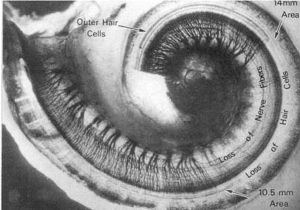Let’s face it: I’m deaf. I didn’t ask to be this way. I don’t find it embarrassing, nor do I feel sorry for myself. There is nothing anyone could do to change or prevent what happened to my hearing. It just is what it is. But the condition does come with some significant challenges, both for myself as well as those I come in contact with.
 I was in my mid-twenties When I first noticed a ringing in my ears. After some urging by my wife, a visit to an audiologist proved there was a significant loss in the high frequency range. That meant I was no longer hearing any of the consonant sounds or ‘e’ sounds. I could hear, but had a difficult time understanding speech. Soon after, I was fitted with my first hearing aid. It was important to me to be able to communicate with those around me.
I was in my mid-twenties When I first noticed a ringing in my ears. After some urging by my wife, a visit to an audiologist proved there was a significant loss in the high frequency range. That meant I was no longer hearing any of the consonant sounds or ‘e’ sounds. I could hear, but had a difficult time understanding speech. Soon after, I was fitted with my first hearing aid. It was important to me to be able to communicate with those around me.
Originally, the hearing loss seemed to appear from nowhere. I later learned that my dad and my great grandmother both experienced significant hearing loss. Although my great grandmother was never fitted with hearing aids (family just talked really loud), my dad was fitted and it has made a big difference. Based on conversations with my dad and other family members, it seems that the hearing loss follows the same pattern in my family. This leads my audiologist to believe that the cause is primarily hereditary. It is also degenerative and permanent. At some point in my future I will most likely be completely deaf and hearing aids will be of little use.
The gradual decline in my hearing over many years has allowed me to develop many coping strategies. I have learned to lip-read, to a certain extent, because I have to in order to form and maintain relationships. I discovered that I gravitate to people who speak clearly – not consciously but rather as the outcome of trying to have a conversation with people who mumble or talk behind their hands or hair was tiring and stressful for me.
I have also learned that because I speak well, people generally have unrealistic expectations of what I can hear. They are sometimes impatient—why couldn’t I just try a little harder and concentrate. Those who know me well have learned to face me and speak clearly if they need to communicate.
I have observed that “Hard of hearing” seems to be more difficult for people to understand than being “deaf”. If someone is completely deaf people generally adjust to this and clearly understand that they cannot be heard (they know the rules). However, when someone is hard of hearing and can hear some things but not others, that can be difficult for hearing people to understand. It can look as if I am choosing what I hear or don’t hear and may be perceived as “selective hearing”. In some cases it my responses (or lack of one) seem odd or rude. This is not the case, I just didn’t hear clearly.
The adventure is an ongoing one. As technology has advanced, it has been able to keep up with my hearing loss (to a certain extent). Hearing aids currently provide an 85% solution, and enable me to live relatively comfortable in the hearing world. Although there is no 100% solution to my problem, I am grateful that I am able to hear what I can and communicate with others reasonably well.
